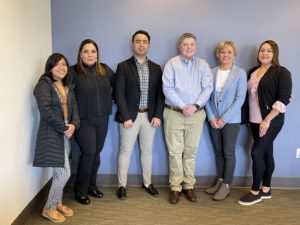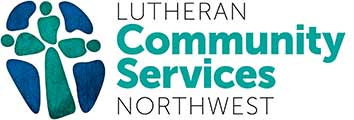Attempting to level the playing field for families seeking asylum
Violence and political persecution have driven a record number of migrant families to seek asylum in the United States. Most are arriving at our Southwest border.
In May 2021, the Biden administration announced a Dedicated Docket initiative to expedite cases of asylum-seeking families entering from this border. In an already backlogged system, Immigration Courts are expected to adjudicate Dedicated Docket cases within 300 days. By comparison, the average wait time for all asylum cases through September 2021 was 1,621 days according to the Transactional Records Access Clearinghouse (TRAC).

The LEAP team (left to right): Dayanne Acevedo, Program Assistant; Claudia Kallenberger, Legal Advocate; Najib Nazhat, Program Director; Lindsay Adams, Immigration Attorney/Program Supervisor; Brenda Hunt, Immigration Attorney; Arleth Torres, Legal Advocate.
“Seattle is one of 11 Immigration Court cities accepting Dedicated Docket cases,” said Najib Nazhat, Director of Refugee and Immigrant Services for Lutheran Community Services Northwest in the Greater Puget Sound District.
“Since most of these families who have been fast-tracked do not have legal representation,” he added, “we partnered with the Vera Institute of Justice to provide legal education, advocacy and referrals for pro bono (no cost) placement to respondents assigned to the Seattle court. While our staff attorneys cannot represent the respondents in front of a judge, they can act as the Friend of Court to aid the court and respondents by providing information and clarification.”
LCS Northwest launched the Legal Education and Advocacy Program (LEAP) in December 2021. Program staff make themselves available at the Seattle Immigration Court four days per week to speak with families who are scheduled to appear. Staff speak with about 20 families per day. Most families assigned to Seattle have come from Brazil and Honduras.
LEAP has two immigration attorneys, Brenda Hunt and Lindsay Adams. They are assisted by two Legal Advocates, Claudia Kallenberger and Arleth Torres, and the Program Assistant, Dayanne Acevedo.
LEAP staff conduct group and individual information sessions at the Immigration Court. They also offer Self-Help Workshops so that asylum seekers can prepare and practice with others who are pursuing similar defenses against removal.
“We cannot represent them in court but we can help them understand how immigration court works, what documents they need to file, and prepare them to navigate a complex legal system on their own,” Hunt said. “We also provide interpretation services.”
A TRAC report shows that more than 72,000 cases were assigned to the Dedicated Docket through December 2021. Only 15.5% of these families had an attorney of record. Of the 1,687 completed cases, 94% resulted in deportation. Only 13 people, all with legal representation, were granted asylum or other form of lawful relief from deportation.
“Legal representation can make a difference, but finding a pro bono attorney is challenging. There’s a big demand for this service,” Adams noted. “We’re seeing some cases close within several months. That’s not enough time to find a pro bono attorney to represent you and prepare the documentation needed to support your case.”
Asylum-seeking families face other hurdles as well. They need to appear for their hearing in Seattle but may live as far away as Spokane. Asylum seekers are usually not eligible to work or receive federal benefits. This can make them vulnerable to food and housing insecurity. LEAP staff can connect families with emergency food, clothing, rent and transportation assistance.
The team has spoken with more than 350 families through mid April. Staff have been leading virtual workshops focused on the requirements of asylum and how to complete form I-589 (Application for Asylum). Over 20 families have requested additional help with completing and submitting their applications. LEAP staff also have helped two families submit requests for prosecutorial discretion through the Department of Homeland Security. One family has been placed with a pro bono attorney.

0 Comments